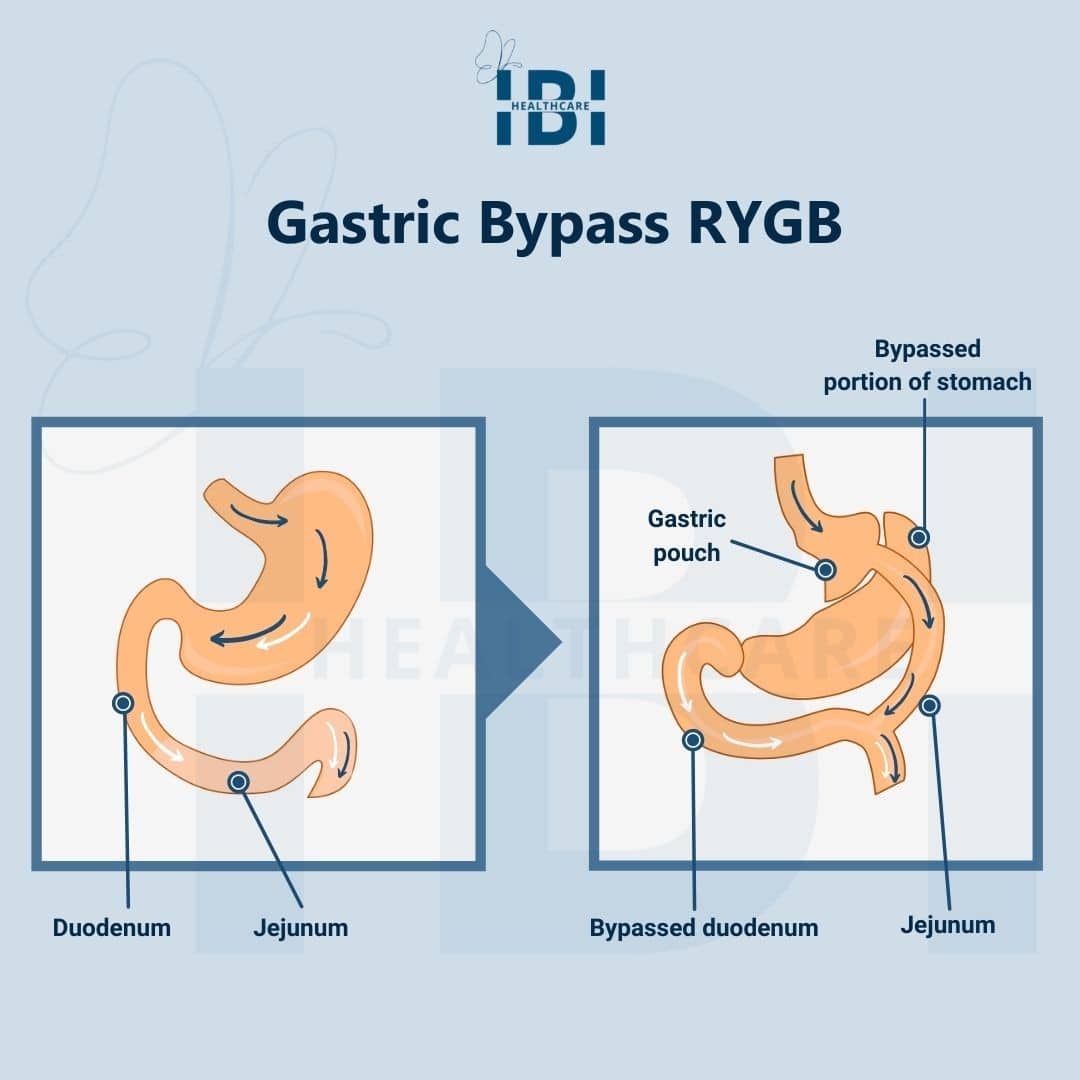After having bariatric surgery your diet completely changes. To be successful in your weight loss journey you will need to alter the way you think about eating. You will need to focus on how to give your body the nutrients it requires to be healthy while working within the parameters of your altered digestive system. Your post-bariatric diet will gradually change as you move forward in your weight-loss journey.
Adapting to the Long-Term Diet after Gastric Bypass Surgery
During the first several months after Gastric Bypass Surgery, your diet will go through several adaptations transitioning from clear liquids to solids. About 6 months after your bariatric surgery, you will begin to modify your eating habits for the long-term future.

Our bodies naturally adapt to our caloric intake and automatically slow down or speed up our metabolism to maintain a certain “set point”. This means you need to be prepared to combat these slow-down periods with a pre-determined strategy.
How you eat immediately after your procedure will not be the same way you eat after a year, 2 years, or maybe even 5 years. How well prepared you are to modify and adjust your eating habits will greatly influence your weight loss progress and maintenance.
Why a Long-Term Diet is Essential after Bariatric Surgery?
Bariatric surgery assists with weight loss by surgically or procedurally reducing the stomach’s size and possibly altering the way the digestive system handles the calories ingested. This allows patients to feel full longer and not feel hungry all the time. When the stomach size is reduced, this also reduces the secretion of the hormone that causes the body to feel hungry.
Bariatric surgery often re-routes part of the digestive system preventing the body from absorbing calories and turning them into retained fat. These are excellent tools but, without a serious commitment to maintaining a healthy diet long-term, the weight loss results may not be as significant as hoped for or weight regain can occur.
Avoiding Deficiencies with Long-Term Diet after Gastric Bypass
The body needs certain things to remain healthy. Most people are familiar with the disease scurvy that killed over two million seamen in the 16th and 17th centuries. It was so common that ship owners added extra crew expecting half of them to die along the way. Scurvy is a vitamin C deficiency. Believe it or not, cases of scurvy still show up today and sometimes are a result of poor diet after bariatric surgery.
The reduced size of the stomach and alterations to the digestive system can pose nutritional challenges to weight loss surgery patients and heighten the risks of deficiency diseases. You must provide your body with what it needs to remain functional and healthy. As a bariatric weight-loss surgery patient, you will most likely be working with a nutritionist who will help outline healthy menus.
Your doctor will give you a list of supplements that you will need to take every day because you will not be able to eat enough to meet the daily requirements your body needs to avoid nutritional deficiencies. Since you will have limited room in your stomach, you will need to make conscious choices about what you are going to eat.
You must make sure you are making choices that pack the most nutrients into the smallest sizes, giving the body what it needs first. Foods that are high in vitamins and protein and low in carbs, fat, and sugar.
What Does “Long-term Gastric Bypass Diet” Mean?
There is a method to eating after bariatric surgery and patients must follow it if they are to achieve success. After bariatric surgery, there are approximately 3 dietary phases:
Phase #1
It consists of 4 steps and starts with clear liquids only, progressing to opaque liquids and purees, soft foods, and then solids. This phase can take three to six months while your stomach is healing.
During phase #1, which can last about 2-3 months, you will lose weight quite rapidly. You will lose weight fast because you won’t feel great recovering from surgery so your appetite won’t be very good and you will be consuming liquids and pureed foods for 2-3 months. Most likely you will have to make an effort to eat and to take your supplements.
Phase #2
It is considered the long-term diet and during this phase, you are working to continually lose excess body weight until your goal weight has been achieved.
Phase #3
It is after you have reached your “goal” or “ideal” weight and your transition into maintaining this weight. The objective is to stay the same weight from now on and neither gain nor lose weight.
Long-Term Diet (Phase 2) after Bariatric Surgery
This diet does not have a solid beginning or end and some of it will become your new normal. This phase officially lasts until you have reached your “goal” or “ideal” weight. Unlike the first three months where the weight loss was very rapid, this weight loss will be slower but consistent if you can develop long-term dietary habits that you can maintain easily.
Recommended calorie intake per day by most bariatric clinics during phase 2 is approximately 900 to 1200 calories. During this time your doctor will have you keep track of your protein intake and calories which are both necessary to achieve safe, steady, and continuous weight loss.
Nutritional Guidelines for Long-Term Diet after Gastric Bypass
- Limit your dietary fat to under 30 grams a day.
- Limit your carb intake to 60 grams or less each day.
- Begin initially with 1-2 ounce meals and gradually work up to 3-4 ounce meals at each sitting.
- You need to stop eating when you feel full. You do not want to stretch out your stomach which will lead to ineffective weight loss or even weight gain.
- Do not forget to take your vitamins and supplements every day. This is the only way you will get everything your body needs since you are on a reduced diet.
- Eat 3 meals a day that are balanced with foods rich in nutrients. Lean meats or fish, low-fat dairy products, whole grains, low-fat starches, fruits, and vegetables.
- Eat as slowly as you can, taking tiny bites and chewing each piece about 20 times. You no longer have to feel guilty about clearing your plate! Stop when you are full.
- Avoid foods that are high in fat, refined carbs, and sugar. These foods are high in calories, do not provide nutritional benefits, can cause malnutrition, and prevent weight loss. Choices like cookies, cake, and processed foods utilize much-needed space in the stomach without providing any nutritional value.
- You must consume enough protein each day. If you are unable to meet your protein requirements through the food you may need to drink a protein shake in between meals. The recommended guidelines for protein intake are about 75 grams per day for men and 60 grams per day for women. Good sources of protein include seafood and fish, chicken, turkey, lean beef*, eggs, cottage cheese, Greek yogurt, beans, legumes, lentils, quinoa, protein bars, and shakes.
Important Note
*A little note about finding lean cuts of beef that have less than 10 grams of total fat. Ground beef is normally labeled with a percentage like 95% lean – this is what you should buy. But when choosing other cuts of beef look for words like “loin” and “round” in the title, such as “sirloin” or “eye of round” as they tend to be lean. Flank steak is also a good choice for lean beef. In addition to being a good source of protein, beef is also full of zinc, selenium, and several B vitamins.
Hydration Guidelines for Long-Term Diet after Gastric Bypass
Stay hydrated! Dehydration is the number one reason bariatric surgery patients are admitted to the hospital after surgery. Although it is often a challenge for patients after weight loss surgery, it is important to remain hydrated. Many doctors recommend patients carry around a 64 oz container of water and take sips on it throughout the day except for 30 minutes before and after meals.
- Drink 64 oz of water a day.
- Do not drink anything 30 minutes before or after each meal.
- An 8-ounce protein supplement or shake can be used to meet protein goals.
Dietary Golden Rule after Gastric Bypass
To ensure your body gets what it needs to function without ending up with a deficiency, here is the Golden Rule of Eating Order. Eat your protein first! Anything on your plate that is protein, such as meat, poultry, eggs, or fish; and then eat your vegetables, followed by fruit and finally, any low-fat starches.
What Can You Never Eat Again after a Gastric Bypass?
Many bariatric doctors recommend no carbonated drinks or chewing gum ever again after bariatric surgery. There are also cautionary foods that weight loss surgery patients may find they cannot tolerate short-term and possibly long-term. You may wish to consult your doctor before proceeding with adding these foods. Some of the foods patients reported having issues with include:
- Pineapple.
- Sweet corn.
- Dried fruits.
- Fibrous red meat.
- Seeds, nuts, popcorn.
- Fruit and veggie skins.
- Boiled rice or soft sticky pasta.
- Mushrooms with a tough texture.
- Raw vegetables that are stringy like celery.
- Soft bread that is not toasted, especially white bread.
Dietary Restrictions
Your dietary restrictions after bariatric surgery will be an ongoing, lifetime process. Initially, your body might reject certain foods, yet over time, it could tolerate those same items without any issues. There may be foods that you will never be able to eat again that are unique to you. It will be a trial-and-error process as you go along.
Alter your eating habits; eat slowly and chew food thoroughly. Failure may lead to nausea, diarrhea, or food blockage. Adjusting your diet might feel overwhelming initially, but it’ll become your new norm over time.
The benefits of your new lifestyle, weight loss, improved health, increased mobility, etc., will outweigh any dietary inconvenience!
If you or a loved one are interested in gastric bypass surgery, contact IBI Healthcare Institute today for a consultation. Our experts provide answers and procedure overviews, guiding your weight loss journey with unwavering support, and ensuring your health’s control.











